Widespread price hikes coming to fuel, gas, electricity and groceries
Australians struggling through record prices for food and petrol will be stung further as other industries pass on price hikes to save themselves.
There is more bad news on the way for Australians already struggling with rising interest rates, record petrol prices and grocery bills that keep going up.
News.com.au reported on Monday that household bills are set to skyrocket in the next 12 months as the cost of living crisis worsens.
It will impact public transport, the cost of seeing a doctor, mobile phone bills and health insurance.
Now energy companies are issuing a warning that their bills will “double” in the next six months and, therefore, so will the energy bills of everyday Australians.
Brickworks Managing Director Lindsay Partridge told the Australian Financial Review on Thursday that it is inevitable costs would be passed on from the manufacturer to the consumer.

“We’re budgeting for a 100 per cent increase (in electricity prices),” he said. “It will have a significant impact.”
“You have to pass those costs on to customers. We would be in real trouble if we didn’t have long-term gas and electricity contracts.”
The trickle-down effect of large global events like the pandemic and the war in Ukraine are being blamed for much of the cost-of-living increases Australians are seeing.
There is an end in sight, but it will not come quickly.
Economist Saul Eslake says manufacturers are feeling the impact of the disruption to the supply chain and vendors are raising prices to survive.
“Businesses have been able to pass on these cost increases to their customers in the form of higher prices because consumer demand has been so strong around the world,” Mr Eslake said.
New research carried out by Finder shows exactly what consumers can expect before things get better.
Rising wholesale energy prices, which soared by 141 per cent this year, will impact Sydneysiders most. They can be expected to fork out up to $252 more for energy per year.
Queenslanders and South Australians will also spend more than $100 extra on their energy bills a year, thanks to increased default market offers (DMO).
Mortgage holders are also in the firing line as the Reserve Bank of Australia raises the cash rate for the third time this year.
Finder says the average homeowner with a $610,000 loan will soon see their monthly repayments increase by $351 a month if the cash rate increases by 100 basis points.
Those renting will also feel the financial sting off the back of investors who may raise weekly repayments to make up for rising costs.
Mobile and data plans are also being impacted as big telco companies get set to increase mobile and data plans.
Telstra is charging its customers between $2 and $4 extra per month. Optus announced it was increasing mobile plans by $4 a month, too, while Optus Sport will soon become a paid subscription service.
Health insurance will change from September with basic hospital cover soon setting back a single policyholder $167 a month.
Treasurer Jim Chalmers has been adamant that the petrol excise cut will not be extended, meaning another price increase is coming at the bowser.

Saving money by catching public transport instead of driving seems like a sensible idea as petrol prices soar but NSW commuters are being stung there, too.
They will bear the brunt of rising public transport costs from this week, with train, bus, light rail and ferry passengers all seeing a 3 per cent increase to their fare.
Certain routes will see transport users pay up to 12.80 extra a month as a result.
So when does it all flatten out? Mr Eslake expects once the war in Ukraine subsides, oil, petrol and possibly even food prices will drop.
The same goes for fresh produce and agriculture affected by the country’s wild weather events, as farmers will be able to produce more supply if their crops have time to grow.
“For some of those commodities, like food and petrol and so forth, what goes up sometimes does come down,” Mr Eslake said.
— with Rebecca Borg




